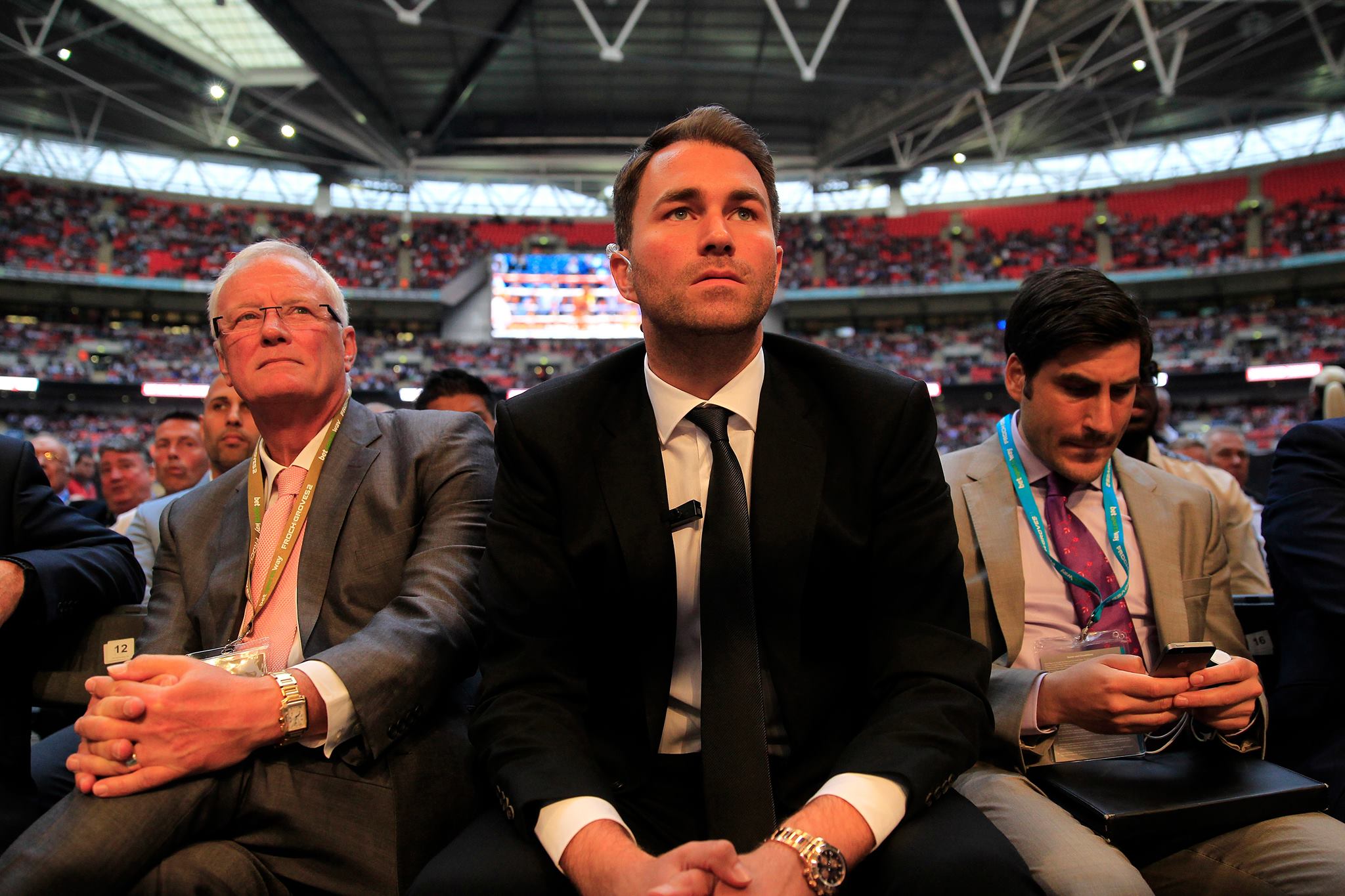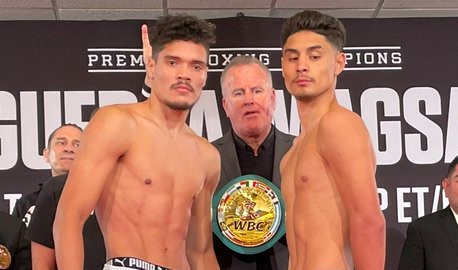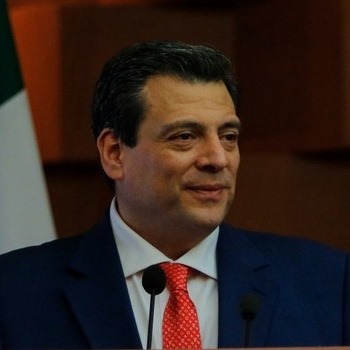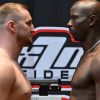by Charles Jay
As folks were watching Julio Cesar Chavez Jr. against Marco Antonio Rubio on Saturday, they were probably very impressed with the way he was performing, considering three factors, at the very least: (a) past efforts, which have found him to be at least a notch or two below the best this sport has to offer, (b) the revelation that, during training, he had been caught drunk driving, and (c) the notion that he has had enough trouble making weight that moving up to the super middleweight division would be a possibility.

Photo: Chris Farina/Top Rank
Of course, Jim Lampley defaults into giving a lot of the credit to Freddie Roach; after all, he is one of the executive producers of a documentary series that is currently airing about Roach on HBO. But could there have been other reasons?
That is the question that is being “aired” now in boxing circles.
Chavez is being accused by Rubio of juicing up on some kind of banned substance, and it had been reported that Chavez had tested positive for a diuretic November 2009 that could also be used as a masking agent for other performance-enhancing substances.
Harold Lederman of HBO complained loudly (and perhaps needlessly) that the WBC was able to push through their own “regulation” that the scorecards be revealed to each corner at the end of four rounds. His point was that such a thing was not part of the “Unified Rules” that have been set forth by the Association of Boxing Commissions (ABC).
Yet there appears to be no “unified rule” that calls for a drug test to be taken after the fight is over. And so the Texas commission doesn’t require it. Well, you knew that already, because it was a subject of discussion when Manny Pacquiao chose to fight there a couple of times.
Or DO they require it?
It’s actually kind of fuzzy.
According to the rules and regulations put in place by the Texas Department of Licensing and Regulation, which governs boxing in Texas…
61.47. Responsibilities of Contestants
(o) The administration or use of any drugs, alcohol, stimulants, or injections in any part of the body, either before or during a bout to or by a contestant is prohibited unless a drug is prescribed, administered or authorized by a licensed physician and the executive director authorizes the contestant to use the drug. If a contestant is taking prescribed or over the counter medication, he/she must inform the executive director of such usage at least 24 hours prior to the bout.
(p) A person who applies for or holds a license as a contestant shall provide a urine specimen for drug testing either before or after the bout, if directed by the executive director or his designee. The applicant or licensee is responsible for paying the costs of the drug screen.
The substances they’re looking for are:
(1) Stimulants
(2) Narcotics
(3) Cannabinoids (marijuana)
(4) Anabolic agents (exogenous and endogenous)
(5) Peptide hormones
(6) Masking agents
(7) Diuretics
(8) Glucocorticosteroids
(9) Beta–2 agonists (asthma medications)
(10) Anti-estrogenic agents
(11) Alcohol
The operative phrase to look at here, in sub-paragraph (o) is, IF DIRECTED BY THE EXECUTIVE DIRECTOR OR HIS DESIGNEE. That means they can either choose to do it or choose NOT to do it.
It was announced last year that the commission would implement “random drug screening procedures” at certain events, dealing with certain combatants beginning November 1. Again, this is at their disrection. Regarding Saturday’s card, here is the official statement that came out of the Texas DLR:
The Texas Department of Licensing and Regulation did not book the drug testing laboratory for the Top Rank event on February 4, 2012. Specimens were taken from Lowry and Martirosyan but in the absence of the independent testing laboratory the integrity of the samples could not be assured and they were destroyed. No further samples were taken.
The Texas Department of Licensing and Regulation regrets this oversight and is addressing the procedure going forward.
Of course, they’re talking about a different fight there – the WBC Silver light middleweight title that was held earlier that evening. But officials of the department confirmed to Boxing Insider that with regard to the Chavez-Rubio fight, (A) No random drug screening was ordered, and (B) No urine sample was ordered by the Executive Director or his designee.
Why the ABC, and people who espouse their philosophy, would be concerned about revealing the scorecards – in progress – to interested parties and not the public, while side-stepping an issue that has very clearly become too big a part of the boxing dialogue, at least at the championship level, is anybody’s guess.
The World Boxing Council is also guilty for having “one foot in.”
The WBC regulations for championship contests require that “It is the responsibility and obligation of the local commission, not the WBC, to arrange for the antidoping testing, including appointment of a doctor or other qualified official to collect the required samples…..”
If such a thing is “required,” then why doesn’t the WBC do it independently, with the fighters who are competing for their title belt? Such a thing would not appear to be impossible, or even implausible.
And as the WBC talks about “obligations” of local commissions, what are the consequences for non-compliance on the part of these regulatory bodies? Nothing, of course. What are they going to do, put the Texas commission on suspension?
When you examine the parts of Section 4 of its championship rules and regulations, it is clear that the WBC wants to do the right thing. There is talk of being able to appoint its own antidoping officials independently and hold hearings when it comes to possible violations.
In Paragraph 4.45, it is stated that “All WBC champions and challengers must adhere to these regulations and any such protocols.”
That covers both Chavez AND Rubio.
The problem is that the protocol, as they have outlined it, has to begin with commission policy. If Texas did not inform the fighters to be ready for urine samples, then you cannot fault Chavez for not taking the test. You can’t fault him under any circumstances, since (a) an inspector should have been with him at all times, even if Texas wanted to enforce the rule, and (b) You can’t reasonably expect Chavez or his handlers to run to the commission to voluntarily submit anything.
In spirit, the WBC has the right idea. But if they really want to “protect the brand,” as its president, Jose Sulamain, is so fond of saying, then the organization has to take the bull by the horns and enforce its own “law” privately. After all, if the fighters want the belt, they can play by the WBC’s rules. And no state has to have anything to do with it, because it is not an issue of being eligible to fight in any one jurisdiction, it is an issue of being able to COMPETE FOR A TITLE.
Keep another thing in mind, which is relevant in light of all the controversy that has surrounded negotiations in the past for the Floyd Mayweather-Manny Pacquiao fight: there is nothing at all wrong when fighters acquiesce to orders that are actually STRICTER than that which a commission prescribes. If they tried to get by with something more lenient, that would be a different story.
But as it stands now, you can’t blame Chavez and you can’t punish him.



















AlbertImipt
06/25/2024 at 1:01 am
pin up 306 https://azerbaijancuisine.com/# pin-up casino giris
pin up yukle
JeffreyMok
06/26/2024 at 7:35 am
https://northern-doctors.org/# mexican online pharmacies prescription drugs
JeffreyMok
06/26/2024 at 10:42 am
https://northern-doctors.org/# mexican border pharmacies shipping to usa
Richardled
06/26/2024 at 2:36 pm
medication from mexico pharmacy [url=http://northern-doctors.org/#]mexican pharmaceuticals online[/url] buying prescription drugs in mexico
Williamfrumn
06/26/2024 at 4:01 pm
medication from mexico pharmacy: mexican pharmacy northern doctors – mexican mail order pharmacies
Williamfrumn
06/26/2024 at 5:53 pm
mexico pharmacy: Mexico pharmacy that ship to usa – mexican online pharmacies prescription drugs
Williamfrumn
06/26/2024 at 9:39 pm
mexican pharmaceuticals online: Mexico pharmacy that ship to usa – pharmacies in mexico that ship to usa
Williamfrumn
06/26/2024 at 11:31 pm
mexico drug stores pharmacies: mexican pharmacy online – mexican rx online
Williamfrumn
06/27/2024 at 7:30 pm
buying prescription drugs in mexico online: mexican pharmacy online – mexican online pharmacies prescription drugs
Williamfrumn
06/27/2024 at 10:53 pm
pharmacies in mexico that ship to usa: mexican pharmacy online – mexican mail order pharmacies
Williamfrumn
06/28/2024 at 2:11 am
mexican border pharmacies shipping to usa: northern doctors pharmacy – mexico drug stores pharmacies
Williamfrumn
06/28/2024 at 8:34 am
mexico drug stores pharmacies: mexican northern doctors – п»їbest mexican online pharmacies
Williamfrumn
06/28/2024 at 3:11 pm
mexico pharmacy: mexican pharmacy online – reputable mexican pharmacies online
Williamfrumn
06/28/2024 at 4:56 pm
п»їbest mexican online pharmacies: mexican pharmacy online – purple pharmacy mexico price list
Richardled
06/28/2024 at 6:13 pm
mexican rx online [url=https://northern-doctors.org/#]northern doctors[/url] buying prescription drugs in mexico
Williamfrumn
06/28/2024 at 6:39 pm
mexican pharmaceuticals online: п»їbest mexican online pharmacies – medicine in mexico pharmacies
Williamfrumn
06/28/2024 at 8:19 pm
mexican border pharmacies shipping to usa: northern doctors – buying prescription drugs in mexico
Williamfrumn
06/28/2024 at 11:36 pm
mexico pharmacy: mexico pharmacies prescription drugs – mexico pharmacies prescription drugs
Stephenrhype
06/29/2024 at 11:44 am
п»їbest mexican online pharmacies: cmq pharma mexican pharmacy – mexico drug stores pharmacies
DonaldBiono
06/29/2024 at 1:06 pm
п»їbest mexican online pharmacies
http://cmqpharma.com/# п»їbest mexican online pharmacies
mexican drugstore online
Ronnienop
06/29/2024 at 4:29 pm
pharmacies in mexico that ship to usa [url=http://cmqpharma.com/#]mexican pharmacy online[/url] buying prescription drugs in mexico online
Ronnienop
06/29/2024 at 7:35 pm
mexican pharmacy [url=https://cmqpharma.com/#]mexican mail order pharmacies[/url] п»їbest mexican online pharmacies
Ronnienop
07/02/2024 at 2:04 am
mexican online pharmacies prescription drugs [url=https://cmqpharma.com/#]cmq pharma mexican pharmacy[/url] mexican pharmacy
Michaelmoolo
07/20/2024 at 2:57 am
buying from online mexican pharmacy: pharmacies in mexico that ship to usa – pharmacies in mexico that ship to usa
Davidtoows
07/20/2024 at 9:50 am
indianpharmacy com: top online pharmacy india – india pharmacy mail order
Davidtoows
07/20/2024 at 3:37 pm
cheapest online pharmacy india: indian pharmacy online – indianpharmacy com
Davidtoows
07/20/2024 at 8:34 pm
canada online pharmacy: the canadian pharmacy – ed meds online canada
Michaelmoolo
07/20/2024 at 9:18 pm
п»їbest mexican online pharmacies: medicine in mexico pharmacies – medicine in mexico pharmacies
Michaelmoolo
07/21/2024 at 6:31 am
mexican drugstore online: mexico pharmacies prescription drugs – buying prescription drugs in mexico
Myronnepay
07/21/2024 at 8:11 pm
http://amoxildelivery.pro/# amoxicillin 500 tablet
paxlovid generic [url=http://paxloviddelivery.pro/#]Paxlovid buy online[/url] paxlovid buy
Myronnepay
07/22/2024 at 5:25 am
http://paxloviddelivery.pro/# Paxlovid over the counter
ciprofloxacin 500mg buy online [url=http://ciprodelivery.pro/#]buy cipro online without prescription[/url] cipro for sale
Thomaskef
07/22/2024 at 2:39 pm
https://amoxildelivery.pro/# where to buy amoxicillin pharmacy
Myronnepay
07/22/2024 at 2:59 pm
https://clomiddelivery.pro/# how can i get clomid no prescription
amoxicillin 775 mg [url=http://amoxildelivery.pro/#]generic for amoxicillin[/url] amoxicillin 500mg prescription
Thomaskef
07/22/2024 at 10:36 pm
http://paxloviddelivery.pro/# Paxlovid over the counter
Myronnepay
07/23/2024 at 12:19 am
http://doxycyclinedelivery.pro/# doxycycline 100mg coupon
doxycycline over the counter singapore [url=http://doxycyclinedelivery.pro/#]can i purchase doxycycline over the counter[/url] doxycycline pills price in south africa
Myronnepay
07/23/2024 at 9:38 am
http://clomiddelivery.pro/# can i order clomid tablets
ciprofloxacin generic [url=https://ciprodelivery.pro/#]antibiotics cipro[/url] ciprofloxacin over the counter
Myronnepay
07/23/2024 at 7:33 pm
http://doxycyclinedelivery.pro/# doxycycline prescription uk
buy ciprofloxacin over the counter [url=http://ciprodelivery.pro/#]buy cipro[/url] buy cipro online without prescription
Thomaskef
07/23/2024 at 9:13 pm
http://ciprodelivery.pro/# cipro pharmacy
Myronnepay
07/24/2024 at 4:51 am
http://amoxildelivery.pro/# buy amoxicillin 500mg capsules uk
paxlovid pill [url=http://paxloviddelivery.pro/#]paxlovid for sale[/url] Paxlovid over the counter